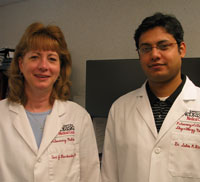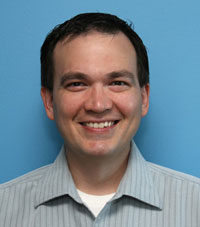 |
From left, Teri Barkoukis, M.D. and Sabin Bista, M.D. |
 |
Michael Summers, M.D. |
She learned of a medical resident who fell asleep at the wheel and died in a car accident. He had been awake for 36 hours straight before the accident.
Dr. Barkoukis, an associate professor in the UNMC Department of Internal Medicine and medical director of The Nebraska Medical Center Sleep Clinic, still remembers how the resident’s parents struggled with their son’s death.
“The couple had lost their only son and was trying to make sense out of a tragic situation,” she said.
It was at Yale University School of Medicine from 1993 to 1996 during a post-graduate fellowship in pulmonary and critical care medicine that she learned about the specialty of sleep medicine. She subsequently conducted a research project in sleep medicine.
“I was fascinated by the fact that you could help almost anyone get better. It’s really satisfying. I was struck by the field,” said Barkoukis, who is board-certified in sleep medicine.
She continues to be struck by the all too frequent stories in the media connecting tragedies with sleep deprivation. Sleep deprivation is common. About 50 percent of drivers on the road have admitted to being drowsy, she said.
Snoring, insomnia and poor sleep habits are some of the multiple issues that cause people to loose sleep. It’s not easy diagnosing the root of sleep problems. There are more than 80 diagnoses in the field of sleep medicine.
Dr. Barkoukis and her team are trying to reduce problems associated with sleep deprivation through the UNMC Sleep Medicine Clinics, and the Sleep Medicine Fellowship program. Although part of the Pulmonary Section, Sleep medicine is a separate board certification process and subspecialty program.
“Often patients are referred to pulmonary for a sleep medicine evaluation instead of directly into the sleep clinics which can delay care,” Dr. Barkoukis said.
The department is expanding with two recent additions to the sleep medicine program and the UNMC Sleep Medicine Fellowship program, a nationally known program that has a waiting list for entrance, said Dr. Barkoukis, who wrote the 12-month curriculum for the program. She also has written two books on the topic of sleep disorders — a board review of sleep medicine in 2003 called “Review of Sleep Medicine”, and a second edition published in 2007.
Sabin Bista, M.D., recently joined as a sleep medicine faculty member after completing the fellowship program, and is now an assistant professor of medicine. Michael Summers, M.D., assistant professor and associate program director of the sleep medicine fellowship program at Rush University Medical Center in Chicago, joined the team on Oct. 1. He takes over as medical director of The Nebraska Medical Center Sleep Center.
Current fellows are Sevag Bananian, M.D., and Alfred Chiang, M.D.
Dr. Summers, a UNMC graduate, said several factors drew him back to UNMC.
“A combination of family and UNMC’s reputation for excellence brought me back to the area,” Dr. Summers said. “I’m still amazed at the research expansion that’s occurred since I was last here in 1999.”
Dr. Summers did a pulmonary/critical care fellowship at Maine Medical Center in Portland, and first received exposure to sleep medicine training at Brigham and Women’s Hospital (a 747-bed teaching affiliate of Harvard Medical School in Boston).
From that experience he chose to pursue further training in sleep medicine, and completed a sleep medicine fellowship at Rush University.
“It’s one of the few fields in medicine that you can literally change someone’s life overnight,” Dr. Summers said. “Though sleep apnea is clearly the most common sleep disorder we see in the outpatient clinic, there are a host of other diagnoses (insomnias, parasomnias, restless legs syndrome, circadian rhythm disorders, disorders of hypersomnolence, etc.) that provide a challenge to diagnose and manage.”
The UNMC Sleep Medicine Fellowship Training Program, which is a one-year training program, was accredited first by the American Academy of Sleep Medicine in 2001. It was recently accredited by the Accreditation Council for Graduate Medical Education (ACGME), which is responsible for the accreditation of post-MD medical training programs within the United States.
Only 46 other ACGME-accredited sleep fellowship programs exist in the United States, according to the American Academy of Sleep Medicine. Each year, Dolores Cunningham, coordinator for the fellowship program, receives a host of applications from fellowship program candidates from across the country.
Applications are accepted from residents graduating from ACGME residencies in pulmonary, neurology, internal medicine, pediatrics, psychiatry and otolaryngology.
“Sleep medicine is a multi-disciplinary field that includes faculty from pulmonary, neurology, pediatrics, dentistry, otolaryngology, psychology and psychiatry,” Dr. Barkoukis said. “We’re a consultant service for primary care providers and specialists. We can guide patients and diagnose and treat their sleep disorders.”
Those who seek help typically are evaluated in the UNMC Sleep Medicine Clinics. Many are referred to the sleep center where sleep studies are conducted by a staff of respiratory therapists with specialized training in sleep disorders and polysomnography. Up to four patients can be accommodated each night in a comfortable hotel-like setting. Day studies are available for narcolepsy (daytime sleepiness condition) evaluations, as well as night shift workers.
Sleep medicine services are in such demand that the clinics are booked for up to three months. There are immediate plans to expand to shorten the waiting time.
Dr. Barkoukis said she isn’t against the occasional use of sleeping pills to get a good night’s rest depending on the medication and the type of sleep disorder, but she said more than occasional use may signal a more complicated sleep disorder.
“The unfortunate thing is prescription sleep drugs are too easily given to patients,” she said. “The problem is, there may be an underlying sleep disorder they don’t know about. You need to get the whole health history to further evaluate the cause of insomnia since snoring and sleep apnea can potentially be exacerbated by prescription sleeping pills.”
Many different things can cause sleep deprivation and it doesn’t help that lack of sleep has become a cultural problem, Dr. Barkoukis said.
“In our break-neck pace, we try to cram too many things into our schedules,” she said.
Not getting seven or eight hours of sleep nightly can cause fatigue, she said.
Sleep deprivation may potentially trigger a host of issues including depression, memory problems, poor judgment and reaction time and falling asleep at the wheel.
Insomnia has many causes including irregular sleep schedules, stress, caffeine, bedtime meals, noise and occasional depression, she said.
Sleep apnea can cause multiple awakenings at night and is the most common problem seen in the UNMC Sleep Clinics, which is on the fifth floor of the Durham Outpatient Center.
“When you awaken the next morning, you’re exhausted and you don’t know why,” Dr. Barkoukis said. “We now know that snoring is a common symptom of sleep apnea, but in some situations sleep apnea is an underlying stress for patients with heart disease. It also can exacerbate hypertension and increase the risk for stroke.”
The majority of apneas begin in the back of the throat. The primary treatment is using Continuous Positive Airway Pressure (CPAP), which allows air to continuously flow into the airway, acting as a type of pneumatic splint to prevent airway closure. Dr. Barkoukis said the device is well-tolerated by most patients with moderate to severe obstructive sleep apnea.
A common test for sleep apnea is called a polysomnography, the gold standard. In
The Nebraska Medical Center Sleep Clinic, patients settle in for an evening.
Though small electrodes are taped on the body, patients can comfortably turn and sleep in any position. The electrodes measure brain waves, eye movements, respiratory and cardiac motion, oxygen level and leg movements.
The clinic is as much like a sound-proof hotel room as possible, Dr. Barkoukis said. Patients arrive around 8:30 p.m. and leave around 6 a.m..
A number of people can get a better night’s sleep by following some simple rules of sleep hygiene, she said.
Good sleep hygiene includes having the right room temperature, a quiet room, avoiding finishing projects near bedtime so the brain can start shutting off and avoiding exercise and eating three to five hours before going to bed, Dr. Barkoukis said.
Smoking cigarettes — which have a caffeine-like effect on the body — also can disrupt sleep, she said.
Dr. Barkoukis said going to bed and waking at the same time — even on weekends — helps regulate sleep.
And what if your mind is racing with the thoughts of the day’s or tomorrow’s activities? If you can’t shut off your brain before going to sleep or wake up in the middle of the night and can’t go back to sleep, write down your concerns.
“If that doesn’t work, visualize your favorite vacation spot or memorize a meaningful poem to replace your thoughts,” she said.
Dr. Barkoukis said drinking alcohol before going to bed does not promote sleep.
“If you have insomnia, that’s the worst thing you can do. Sleep becomes more disrupted because you wake up more,” she said. “Once the effects of alcohol wear off, you’re worse-off. Your last drink should be four to five hours before going to bed.”
And for the baby-boomers and older adults, here’s a tip.
“It’s a myth that you don’t need as much sleep as you get older. You need seven to eight hours of sleep,” she said.
Care providers who wish patients to be seen for any sleep disorders may call 559-4015 and request a sleep medicine evaluation in the sleep medicine clinics.
For more tips, go to the National Sleep Foundation’s Web site at www.sleepfoundation.org.